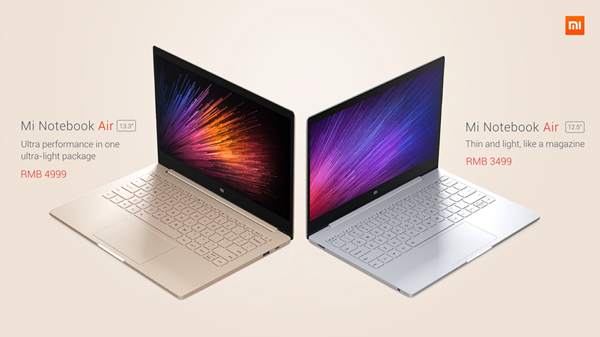Xiaomi rolls out laptop to take on Lenovo, Apple
 0 Comment(s)
0 Comment(s) Print
Print E-mail Xinhua, July 28, 2016
E-mail Xinhua, July 28, 2016
 |
|
Xiaomi's first laptop Mi Notebook Air. [Photo/Xiaomi] |
Chinese smartphone maker Xiaomi rolled out its first laptop on Wednesday, testing the waters in a market that has been eroded by premium productivity tablets.
The laptop, called Mi Notebook Air, sells for 4,999 yuan (around US$749) for a 13.3-inch display. It runs on Microsoft's Windows 10 operating system and is powered by Intel's Core 5 processor, a discrete graphics card and expandable storage. A slimmed-down version for office use is also available for 3,499 yuan.
The laptop is priced at a discount compared to many models with similar specifications from leading brands such as Lenovo, Dell, HP and Apple. It is the Beijing-based firm's latest attempt to press ahead with its strategy of releasing top-spec devices at low prices.
"Xiaomi will continue to roll out budget devices with key components in the same league as those on premium devices," said Xiaomi co-founder Lei Jun during Wednesday's product launch in Beijing.
The company also launched a new phone under its budget smartphone line RedMi. The RedMi Pro is powered by MediaTeK's flagship processor Helio X25 and sells for between 1,499 and 1,999 yuan depending on specifications.
Xiaomi's chief domestic rival, Huawei, rolled out a tablet computer with Windows 10 and a detachable keyboard earlier this year.
Global PC shipments have declined for seven consecutive quarters as of the second quarter this year, according to tech consultancy Gartner. Lenovo, the world's top PC maker, reported a drop in shipments of 2.2 percent in the second quarter, while Apple, ranked fifth, posted a 4.9-percent drop in the same period. On the Chinese mainland, shipments slid 6.4 percent as a slowing economy bit into demand for PCs by both businesses and consumers, Gartner said.
Analysts have attributed part of the decline in the PC market to a shift to tablet computers that can handle productivity needs. Devices such as the Microsoft Surface tablet and Apple's iPad Pro have sought to replace PCs for consumers who seek a combination of productivity and mobility.
"As a device, the tablet is going through a period of recalibration as productivity becomes more important [and] enterprises purchase more touchscreen and mobile-first devices for a new generation of workers," said Eric Smith, an analyst at tech consultancy Strategy Analytics.
"We expect [PC] shipments to continue their slow decline over the next couple of years, during which the usefulness, quality, and average selling prices of tablets [will] grow," Smith added.
While its China release is scheduled for August 2, Xiaomi has yet to announce details about the availability of its laptop elsewhere. Huawei has been selling its Matebook tablet in Europe as well as China and other emerging markets. Both companies face hurdles in selling consumer electronic devices in the United States.
The duo has been locked in a breakneck battle over market share for consumer electronics, but the companies have employed increasingly different approaches. While Xiaomi has continued to push forward its strategy of packing impressive specs into budget devices, Huawei has sought to create premium products for higher margins.
Huawei said earlier this week that its consumer segment reported a revenue increase of 41 percent to 77.4 billion yuan on top of a 25-percent increase in shipments in the first half of the year.






Go to Forum >>0 Comment(s)